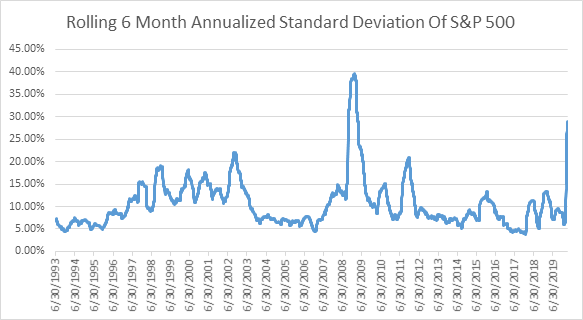Key Points:
- Hindsight may be telling us we should have sold in March. Don't listen.
- Sticking with an investment strategy is always the best course of action, through thick and thin.
- It's a good time to reassess our goals and tolerance for risk.
Did you see this crisis coming?
A lot of us, at this stage, are looking back to February or early March and wondering how we missed it. We remembered SARS, we remembered Swine Flu, and we remembered worrying at the time of those outbreaks about the possibility of a wider-ranging pandemic. And then there it was, right on our virtual doorstep, and we didn't do a thing. Couldn't we have sold at least a portion of our investment assets and dodged some of the carnage?
Don't beat yourself up over not selling back then. If you had, sure, you would be patting yourself on the back right now. But you would also have been engaging in market timing, and market timing loses in the long run.
Here's what we mean. If you have trained yourself to be an investor, rather than a trader, you knew to sit tight. You knew not to lock in losses by selling after the crash. You knew that market crashes happen, but that they eventually end.
You also knew that the chances of getting the timing even close to right--that is, selling at or near the top, and buying at or near the bottom--was going to be nearly impossible. Sticking with the program of investing in low-cost index funds or dividend-generating stocks was going to be the best course of action as always.
Let's say you did see the potential effects of the virus on the markets, and decided to sell some holdings. But then what? Would you have known when to buy back in again? With volatility as high as it has been, you would have risked doing extensive damage to your portfolio.

The market bottom--so far--was around March 23. If you had started buying then, you would be up more than 20% as of the time of this writing. That sounds pretty good.
First of all, fat chance of that happening (buying at the bottom). But even if you had, again the question becomes, "then what?" You could sell it all again and be happy with your 20% gains in about a month's time. You might dodge further drops, yes, but you would definitely miss out on any recovery.
If you start engaging in market timing, where does it stop? Will you, going forward, sell at the hint of political crisis, military conflict, or inflation? You could tell yourself that you'll only try to time the market when things look like they could get really bad, but you would almost surely be kidding yourself. Your investing discipline will be broken; your investment results will suffer.
All of this is not to say that you should always do absolutely nothing during times like these. Market swoons are a good time to reassess your relationship with risk. It has been easy to be complacent over the past several years, even the past decade for the most part; it's possible the last time you took a hard look at your risk tolerance was many years ago, and that your tolerance has changed.
You may not want to sell assets at a loss--nobody likes to do that. But, at the same time, you should ask yourself what would happen if the markets dropped 20% or more from here. Would you have the mental fortitude to ride the rollercoaster yet again? Could you sleep at night? And, even more important than that, would you be able to eat and pay the bills? In addition to giving yourself a risk-tolerance check, it's also a good time to check your liquid asset (cash and cash equivalents) balances and make sure you're comfortable with them. Anecdotally, low cash balances are another thing that complacency has wrought. Investors who felt like they were missing out on seemingly guaranteed gains might have put more cash to work than they should have.
Building your liquid balances back up to levels you're comfortable with, even if it means taking some losses on your equity portfolio, could be a good thing to do right now. Retirees should already have a good sense of what kind of cash backstop they are comfortable with. But given the prospect of a lengthy recession and lay-offs, investors still in the workforce probably should also give their cash balances a hard look, and beef them back up now if necessary.
Oftentimes, just when we think we have volatility tamed, it roars back. But just because it disappears for a while doesn't mean it has been vanquished. As investors, we learn and re-learn this lesson over and over.